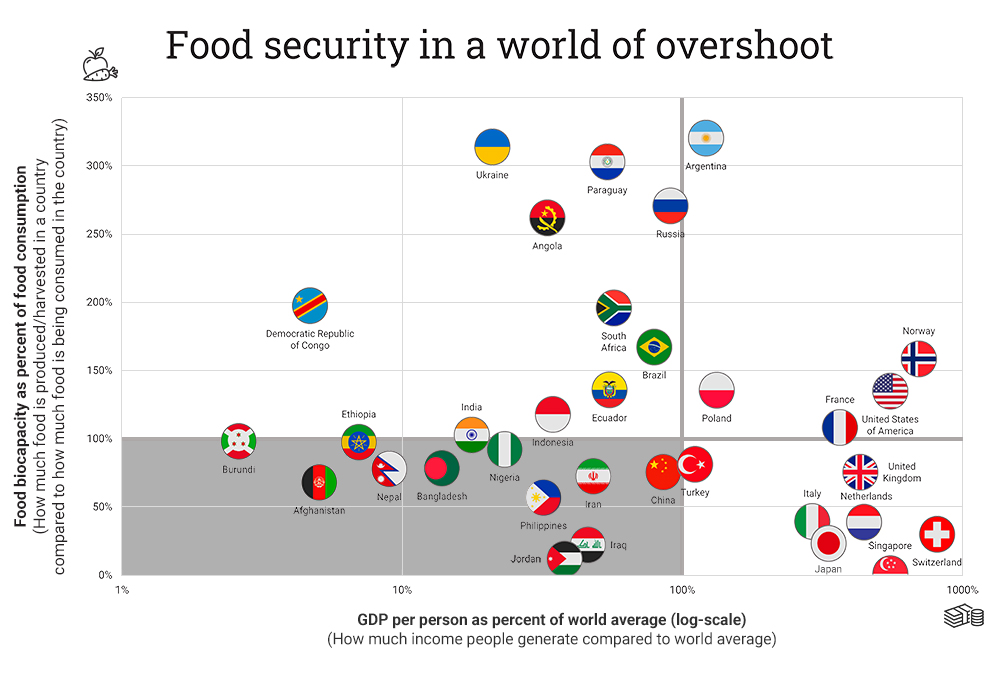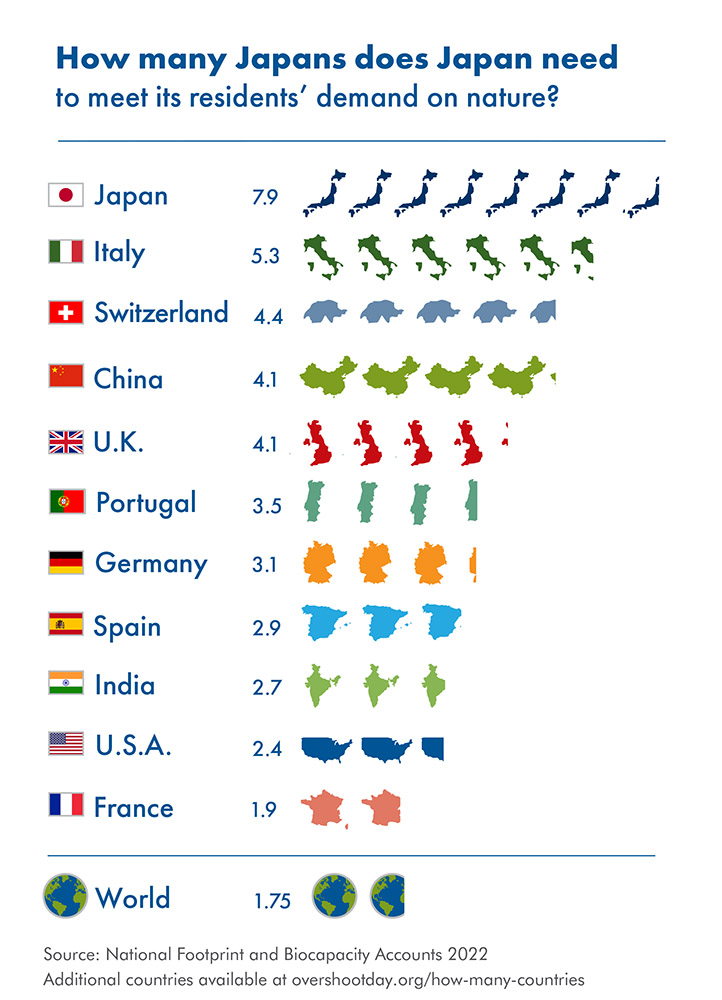

Earth Overshoot Day 2022:
Ecuador’s Minister of Environment calls for “seizing the ecological power to shape our future”
QUITO, ECUADOR—July 28th, 2022—Ecuador’s Minister of Environment, Water and Ecological Transition, Gustavo Manrique, presided the launch of Earth Overshoot Day 2022 in Ecuador’s Cancillería (July 28). He was joined by Vice Minister of Foreign Affairs and Human Mobility Luis Vayas Valdivieso, and Global Footprint Network founder Mathis Wackernagel. The event featured supporting video statements from ministers from around the world. Environment ministers included Carlos Correo from Colombia, Zac Goldsmith from the UK, Rosalie Matondo from the Republic of the Congo, and Milciades Concepción from Panama. A recording of the event can be seen here. Minister Manrique also signed an MoU with Global Footprint Network with the intent to form a “One-Planet Alliance.”
“Earth Overshoot Day demonstrates that the current system of production and consumption is not compatible with the intention to continue to inhabit this planet. To better protect our natural resources and manage our demand for them, it is necessary to take concrete joint actions aimed at a new development model based on sustainability and regeneration. From Ecuador we call on the world to commit to this cause,” explained Minister Gustavo Manrique.
Ecuador’s unique tradition puts nature at its center. In 2008, it made history when it became the first country in the world to grant nature legally-enforceable constitutional rights to ”exist, flourish and evolve” through an overwhelming popular vote. Ecuador ranks as one of the countries whose Overshoot Day arrives the latest in the year (December 6 this year), which means its Ecological Footprint per person is only slightly higher than the worldwide average biocapacity per person.
The date of Earth Overshoot Day is calculated each year by Global Footprint Network, using National Footprint and Biocapacity Accounts data. This day reminds us that the persistence of overshoot, now for over half a century, has led to huge decline in biodiversity, excess greenhouse gases in the atmosphere, and heightened competition for food and energy. These symptoms are becoming more prominent with unusual heat waves, forest fires, droughts, and floods.
The economic pressures are already playing out. As Global Footprint Network’s research shows, that by now more than 3 billion people live in countries which produce less food than they consume and generate less income than world average. This means they have inadequate food capacity and a huge disadvantage in accessing food on global markets. If we include all resources, not just food, the number of people exposed to this double challenge climbs to an astonishing 5.8 billion people.
“Resource security is turning into an essential parameter of economic strength. There is no advantage in waiting for others to act first. Rather, it is in the interest of every city, company, or country to protect its own ability to operate in the inevitable future of more climate change and resource constraints.” commented Mathis Wackernagel, founder of Global Footprint Network.
“Cities hold the key to clean infrastructure transformation. Quito for its conservation of protected areas, Santiago de Chile for its number of electric buses, or Bogota for its bike paths show how local governments give their cities a better chance to have a solid future,” said Sebastian Navarro, Secretary General of CC35, the Coalition of Capital Cities of the Americas on Climate Change.
Turning the trends around is not just possible, it economically benefits those who lead the charge. There are plenty of possibilities that are economically viable while also reducing overshoot, including:
- Cutting food waste in half worldwide, as practiced in many community initiatives around the world, would #MoveTheDate of Earth Overshoot Day 13 days.
- Upgrading urban bicycle infrastructure worldwide, to a level we currently find in the Netherlands, has the potential to #MoveTheDate of Earth Overshoot Day 9 days.
- Producing power by cost-competitive on-shore wind, as practiced in Denmark and Germany, has the potential to #MoveTheDate of Earth Overshoot Day by at least 10 days.
“The power of possibility gives us examples of how to build the future we need.” concluded Wackernagel.
Key facts behind Earth Overshoot Day
- To renew everything humanity currently demands from nature would take the biocapacity of 1.75 Earths.
- 60% of the world’s Footprint is carbon emissions. To avoid runaway climate change, it needs to be zero before 2050, without increasing other parts of the Footprint.
- 3 billion people live in countries that produce less food than they consume and generate less income than world average.
- 8 billion people, or 72% of the world population, live in a country that runs a biocapacity deficit and generate less income than world average.
- This year, Earth Overshoot Day and the end of the year are separated by 156 days.
- The 50-year persistence of overshoot means that the annual deficits have cumulated in an ecological debt of 19-years worth of planetary regeneration. The result is widespread degradation of ecosystems and an atmosphere filled with GHG.
- If humanity delays Earth Overshoot Day by 6 days every year, humanity will be below one planet before 2050. To follow the preferable IPCC 1.5°C scenario path, we’d need to move the date 10 days every year.
- Plenty of possibilities exist, and are economically viable, to reverse overshoot. These ventures are also more likely to grow in value than assets which contribute to overshoot.
Additional resources
- Press releases in multiple languages
- CC35, the Coalition of Capital Cities of the Americas on Climate Change.
- Power of Possibility – examples of how overshoot trends can be turned around
- Footprint platform – Ecological Footprint results for more than 200 countries and regions
- Circular Businesses are shifting the trends
- Blog: Food security in a world of overshoot (with figure)
- Background: One Planet Alliance in support of National Footprint and Biocapacity Accounts
- WWF France food report
- Nature paper “The Importance of Resource Security for Poverty Eradication”
About the Ecological Footprint
The Ecological Footprint is the most comprehensive biological resource accounting metric available. Based on 15,000 data points per country per year, it adds up all of people’s competing demands for biologically productive areas – food, timber, fibers, carbon sequestration, and accommodation of infrastructure. Currently, the carbon footprint, i.e., the carbon emissions from burning fossil fuel, make up 61 percent of humanity’s Ecological Footprint. The National Footprint and Biocapacity Accounts are now produced by FoDaFo with York University in Toronto.
About Global Footprint Network
Global Footprint Network is an international sustainability organization that is helping the world live within the Earth’s means and respond to climate change. Since 2003 we’ve engaged with more than 50 countries, 30 cities, and 70 global partners to deliver scientific insights that have driven high-impact policy and investment decisions. Together, we’re creating a future where all of us can thrive within the limits of our one planet. www.footprintnetwork.org
Media Contacts
Alessandro Galli, Ph.D., Director, Mediterranean and MENA Regions
Mediterranean Office of Global Footprint Network
alessandro@footprintnetwork.org | +39-347-9034977 (mobile) | Italian, English
Marta Antonelli, Ph.D., Food Systems Lead
Swiss office of Global Footprint Network
marta.antonelli@footprintnetwork.org | +41 78 656 28 44 (mobile) | Italian, English
Amanda Diep, Director, Communications
Global Footprint Network, USA
amanda.diep@footprintnetwork.org | (510) 839 8879 Ext 4 | English
Laetitia Mailhes, Media and Communications
laetitia.mailhes@footprintnetwork.org | +33-650-979-012 | French, English


